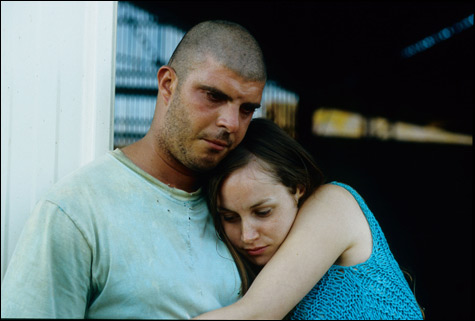
FLANDRES: The dull brutality seems real; the “I love you” catharsis does not. |
The last time I saw Paris, it certainly wasn’t in a film by Bruno Dumont. The Gallic filmmaker’s focus is the unfashionable farmlands and dull rural villages of Northern France: the out-of-the-way cosmos of La vie de Jésus|The Life of Jesus (1997), L’humanité (1999), and now Flandres, which after a screening in the Boston French Film Festival opens at the Kendall Square this Friday.
As in Dumont’s earlier films, prole non-actors play the key roles, and what he asks of them is mostly to be their real-life, humdrum, inarticulate, passively brutish selves. Here, we’re looking at André Demester (Samuel Boidin), an almost maddeningly expressionless and laconic farmer who suddenly gets called to la guerre. What war? Where? He doesn’t ask, he doesn’t tell, but he’s supposed to report on Monday.
Andre has a sort-of-girlfriend, Barbe (Adélaïde Leroux), a neighbor farm gal, and they walk together in a field. She lies under him and he climbs on, grunts, shoves in and out. Rising, he says nothing; he just climbs on his tractor. (He doesn’t fuck his tractor.) A romantic fellow! Desiring to make André jealous, Barbe jaunts off for a hot night with Blondel (Henri Cretel), a handsome newcomer to the Flanders ’hood. But André is as impassive as ever — he even heads off to battle with his rival for Barbe. Yes, he does muster a facial expression, a wee patriotic smile when he sights his inductee pals singing “La Marseillaise.”
So, where is this war? It’s a mythical one, since the French these days haven’t joined George W.’s legionnaires in Iraq. Dumont never identifies the dusty, sandy, nasty Hades where André and Blondel incongruously land, and where they find themselves unmoored after their fair captain is blown apart.
I’m not sure of the point, but there’s an eye-popping 20 minutes of surreal chaos, as a little band of Frenchmen including our heroes march about blindly shooting and raping and being sodomized, castrated, and shot dead in return. (According to production notes, Dumont filmed this wild, amoral stuff in Tunis.) Meanwhile, in boondock France, Barbe, the girl they left behind, is becoming crazy with loneliness, not to mention getting pregnant by Blondel.
Is Dumont repeating himself in Flandres? Should his canvas extend beyond this tiny, tight-lipped, dreary world of rural lumpen? “Expect a happy ending,” I joked as I watched, believing that Dumont would never steer us out of his movie-to-movie misery. But, lo!, he provides a bit of a character breakthrough, an “I love you” catharsis at Flandres’s conclusion — and it’s as unconvincing and unmotivated as a soppy finish from La La Land.
I saw Edward Yang once, in January 2001 at the late great World Trade Center, where he was fêted by the New York Film Critics Circle for his masterly Yi Yi. The shy Taiwanese filmmaker was clearly uncomfortable being pushed into a press line and forced to walk a gauntlet of photographers and journalists, the latter all with the same idiot-card question, “What does it mean to you to be honored tonight?”